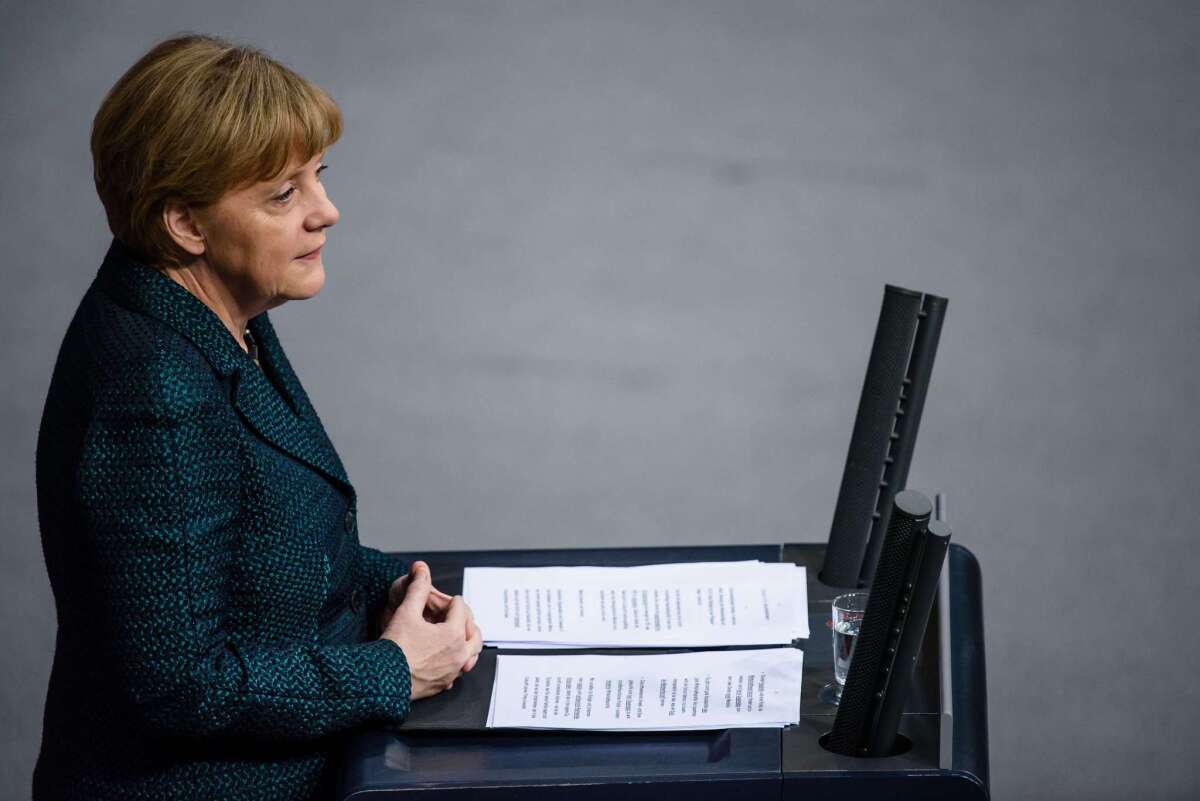German-Russian relations said headed for long impasse over Ukraine

- Share via
German Chancellor Angela Merkel put her political colleagues on notice Wednesday that relations with Russia may be in for long-term difficulties over Moscow’s aggressions against Ukraine.
In her toughest assessment yet of Russian President Vladimir Putin, Merkel said in a speech to the German parliament in Berlin that Germany needed to exercise “patience and staying power” to resolve the crisis of the Kremlin’s use of force to change internationally recognized borders.
Her comments echoed repeated warnings over the past two weeks from NATO officials that Russia has been engaged in a menacing buildup of troops and armor along Ukraine’s border and has been sending forces and arms into the eastern regions of its neighbor that are occupied by pro-Russia separatists.
German Foreign Minister Frank-Walter Steinmeier added his voice to the growing chorus of bleak assessments of relations with Moscow in his own speech to the Bundestag on Wednesday, saying that German-Russian ties needed to be “remapped” because it was entirely unclear where the two nations will stand diplomatically in 10 or 15 years.
Merkel has expressed concern about Russia’s reaction to moves by Ukraine toward eventual membership in the European Union and the North Atlantic Treaty Organization. On Monday, Ukrainian President Petro Poroshenko said the decision on whether to join NATO would be put to a referendum once the conditions for membership have been met, which he predicts won’t be achievable until about 2020.
Kremlin spokesman and top Putin advisor Dmitry Peskov told the BBC in an interview last week that Russia wants “a 100% guarantee” that Ukraine won’t be admitted to the 28-nation military bloc. Peskov said the encroachment of the Western bloc made the Kremlin “nervous.”
That message was reportedly conveyed to Steinmeier during his Moscow visit a week ago, from which he returned with little to say except that the West and Russia are effectively at an impasse over Moscow’s annexation of Crimea eight months ago and the fighting that has engulfed eastern Ukraine. More than 4,300 people have been killed since April, many of them civilians felled by indiscriminate shelling by government forces and their rebel opponents.
While Russia’s sensitivities about the approach of its former ideological rivals may be understandable, “none of this justifies or excuses Russia’s annexation of Crimea .... None of this justifies or excuses the direct or indirect participation in the fighting in Donetsk and Luhansk. Russia is breaching Ukraine’s territorial integrity,” Merkel told the lower-house lawmakers.
NATO Secretary-General Jens Stoltenberg repeated his accusation that Putin’s Kremlin is “destabilizing” Ukraine with fresh infusions of weapons and fighters.
“We see the movement of troops, of equipment, of tanks, of artillery, of advance air-defense systems, and this is in violation of the cease-fire agreements,” Stoltenberg said, referring to a Sept. 5 truce signed by Ukraine, Russia and the separatists but repeatedly violated.
NATO’s top military commander, U.S. Gen. Philip Breedlove, was in Kiev, the Ukrainian capital, on Wednesday for meetings with top officials. He accused Moscow of “militarizing” Crimea and of seeking to extend Russia’s strategic reach across the whole of the Black Sea area bordered by several NATO member states.
Breedlove said the alliance was on the watch for indications that Russia would station “nuclear capabilities” on the territory, which is home to Russia’s Black Sea naval fleet and other strategic bases.
Follow @cjwilliamslat for the latest international news 24/7
More to Read
Sign up for Essential California
The most important California stories and recommendations in your inbox every morning.
You may occasionally receive promotional content from the Los Angeles Times.













